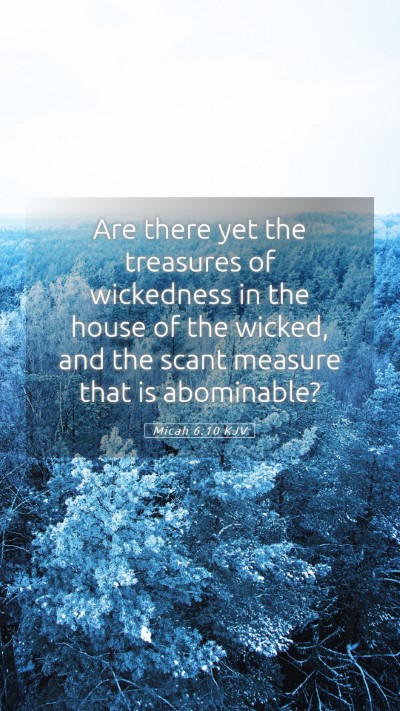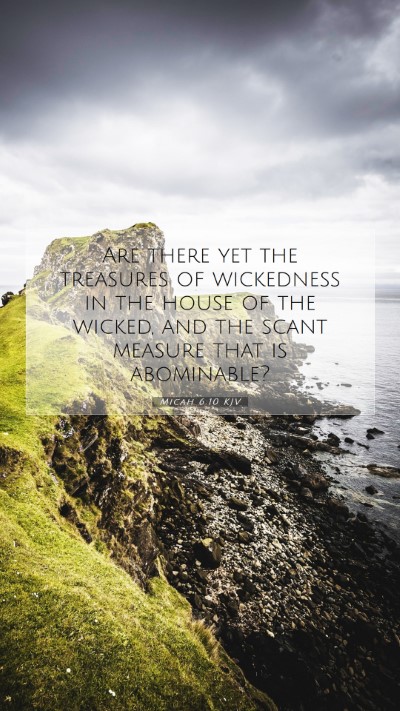Old Testament
Genesis Exodus Leviticus Numbers Deuteronomy Joshua Judges Ruth 1 Samuel 2 Samuel 1 Kings 2 Kings 1 Chronicles 2 Chronicles Ezra Nehemiah Esther Job Psalms Proverbs Ecclesiastes Song of Solomon Isaiah Jeremiah Lamentations Ezekiel Daniel Hosea Joel Amos Obadiah Jonah Micah Nahum Habakkuk Zephaniah Haggai Zechariah MalachiMicah 6:10 Meaning
What is the meaning of Micah 6:10?
Are there yet the treasures of wickedness in the house of the wicked, and the scant measure that is abominable?
Micah 6:10 Bible Verse Meaning
Bible Verse Commentary on Micah 6:10
Verse: Micah 6:10 - "Are there yet the treasures of wickedness in the house of the wicked, and the scant measure that is abominable?"
Introduction
The verse Micah 6:10 poses a rhetorical question that highlights the injustices present in the society of Israel during the time of the prophet Micah. It reflects God's call to His people concerning their moral and ethical standings. Understanding this verse requires careful examination of its implications and the context surrounding it.
Meaning of the Verse
- Moral Integrity: Micah challenges the people by questioning the existence of dishonest practices among the wealthy. This serves as a reminder of the larger issue of integrity and honesty in trade and personal dealings.
- Divine Judgment: The imagery of "treasures of wickedness" indicates that ill-gotten gains are subject to God's judgment. The prophet conveys that God is aware of all injustices and will hold individuals accountable.
- Social Critique: The “scant measure” refers to dishonest measures used in commerce. This suggests a broader critique of societal norms that allow cheating and fraud, thereby invoking a call for repentance.
Commentary Insights
Matthew Henry's Commentary
Matthew Henry emphasizes that this verse underscores the folly of hoarding wealth gained through dishonest means. He suggests that such treasures are not truly beneficial and evoke God's wrath rather than His blessing. Henry asserts that God sees through the façade of human intentions and will surely expose the wickedness of the heart.
Albert Barnes' Commentary
Albert Barnes interprets this verse as a rhetorical question highlighting the absurdity of trusting in wealth accumulated through injustice. He points out how society can be blinded by the allure of riches, forgetting that integrity and ethical behavior are foundational to a true relationship with God. Barnes stresses that such practices lead to societal decay and God's ultimate judgment.
Adam Clarke's Commentary
According to Adam Clarke, Micah 6:10 serves as a divine indictment of the social injustices rampant in Israel. Clarke notes that the mention of “scant measure” reflects a widespread problem of deception in trade, which negatively affects community ties and diminishes trust. He calls for a return to just practices as a means of repairing the community's relationship with God.
Understanding Scripture in Context
To fully appreciate Micah 6:10, it is essential to explore the historical and cultural context of ancient Israel. The people were often engaged in practices that contradicted God's commands, leading Micah to call them to repentance. This verse serves as part of a larger message concerning God's expectations for justice, mercy, and humility among His people.
Application of the Verse
Micah 6:10 reminds modern readers of the importance of integrity in personal and business affairs. It encourages individuals to evaluate their ethical practices and consider how they align with their faith. In a world that often equates success with wealth, this verse calls for a re-evaluation of priorities that favor righteousness over riches.
Related Bible Cross References
- Proverbs 11:1 - "A false balance is abomination to the Lord: but a just weight is his delight."
- Amos 8:5 - "Saying, When will the new moon be gone, that we may sell corn? and the sabbath, that we may set forth wheat, making the ephah small, and the shekel great, and falsifying the balances by deceit?"
- Isaiah 33:15 - "He that walketh righteously, and speaketh uprightly; he that despiseth the gain of oppressions, that shaketh his hands from holding of bribes, that stoppeth his ears from hearing of blood, and shutteth his eyes from seeing evil."
Conclusion
In conclusion, Micah 6:10 serves as a profound reminder of the need for integrity and justice in our dealings, echoing through centuries the unchanging nature of God’s expectations. By understanding this verse, individuals can gain insights into aligning their lives more closely with God's will, fostering a culture of honesty and righteousness.


